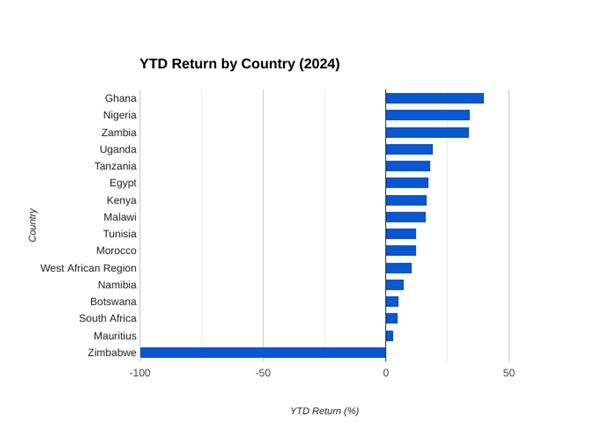By Joshua Worlasi AMLANU & Ebenezer Chike Adjei NJOKU
joshua.amlanu@thebftonline.com/[email protected]
Ghana Stock Exchange (GSE) has recorded the highest year-to-date returns among major African indices, recent data have shown. Its Composite Index (GSE-Composite) has risen by 39.95 percent, leading a group of 16 African stock markets analysed by the B&FT.
This comes as the Accra bourse has defied economic headwinds and reported returns that significantly exceed earlier market projections for the year 2024. As of the second trading day of July’s penultimate week, the GSE-CI closed at 4,380.63 points.
Following closely behind GSE’s performance is Nigeria, with its NGX All Share index showing a 34.39 percent increase. Zambia’s LuSE All Share index rounds out the top-three performers with a robust 33.73 percent gain.
Several other African markets have also posted double-digit returns. Uganda’s USE All Share index has climbed 19.05 percent, while Tanzania’s DSE All Share and Egypt’s EGX 30 have risen by 18.03 percent and 17.28 percent respectively.
Kenya’s NSE All Share index has grown by 16.62 percent and Malawi’s MSE All Share has increased by 16.25 percent. Tunisia and Morocco have seen similar gains, with the TUNINDEX up 12.53 percent and the MASI rising 12.49 percent. The regional Francophone West African BVRM-Composite has also performed well, showing a 10.72 percent increase.
Some markets have experienced more modest growth. Namibia’s NSX Overall index has risen by 7.56 percent while Botswana’s BSE Domestic Companies index has increased by 5.10 percent. South Africa, despite being the continent’s most developed economy, has seen its JSE All Share index grow by just 4.96 percent. Mauritius brings up the rear of positive performers, with its SEM All Share index rising 3.11 percent.
Standing out as a significant outlier is Zimbabwe’s ZSE All Share index, which has experienced a dramatic decline of 99.9 percent. This stark contrast to the rest of the continent’s performance may indicate severe local economic challenges or significant structural changes in the Zimbabwean market.
GSE pattern
Over the past week, the GSE-CI – which serves as the primary indicator of overall market performance – recorded a 7.22 percent increase while the four-week gain stood at 15.34 percent and a one year return of 53.2 percent.
On a similar tangent, the GSE Financial Stocks Index (GSE-FSI) has also demonstrated positive momentum. The FSI reached 2,090.51 points, registering a 9.94 percent YTD increase. While this growth is more modest compared to the broader market, it still represents a significant vote of confidence in Ghana’s financial sector – which is recovering from effects of the Domestic Debt Exchange Programme (DDEP).
The market’s performance has outpaced analysts’ forecasts by a considerable margin. Databank had projected a year-end return of 20 percent (±500bps), but the actual performance has already surpassed this projection with several months remaining in the year.
In the past year, GSE’s market capitalisation has reached record highs. In 2023 it surpassed the GH¢70billion mark for the first time, closing the year at 73.89 billion. In 2024, it crossed the GH¢80billion mark in May and GH¢90billion mark in July. This metric has been bolstered by the listing of Atlantic Lithium. However, fresh Initial Public Offerings (IPOs) continue to elude the market. The market cap at the time of seven days to end-July 2024 was GH¢92.13billion.
In the context of Ghana’s broader financial sphere, equities have consequently emerged as the standout performer among asset classes. The stock market’s returns have comfortably outpaced those of traditional safe-haven investments such as Treasury bills.
For comparison, the 91-day, 182-day and 364-day T-bill yields settled at 24.79 percent, 26.71 percent and 27.81 percent respectively during the period in July 2024. While these rates are attractive in absolute terms, they pale in comparison to returns offered by the equities market.
‘Significant Market Player’
At the heart of GSE’s success story is MTN Ghana, the telecom giant that has become synonymous with the exchange’s bullish run. MTN’s share price has skyrocketed to a record GH₵2.25, representing a 200 percent increase from its IPO price of GH¢0.75. This remarkable feat has catapulted MTN’s market capitalisation to GH¢29.8billion, accounting for 32.34 percent of the GSE’s total value.
In 2023, the company reported a 34.6 percent increase in total revenue, reaching GH¢13.3billion. This positive momentum carried into the first quarter of 2024, with total revenue rising by 32.5 percent year-on-year to GH¢3.85billion. The company’s core service revenue mirrored this growth trajectory, increasing by 32.4 percent to GH¢3.83billion.
Profitability metrics have been equally impressive, with MTN’s profit after tax surging by 49.3 percent to GH¢1.11billion.
MTN started the year with a share price of GH¢1.40, surging 60.7 percent YTD and securing fourth spot on the GSE in performance rankings.
This comes as it is the most actively traded stock over the past three months. During this period, MTN saw a total volume of 325 million shares traded, valued at GH¢513million and averaging 5.17 million shares per trading session.










